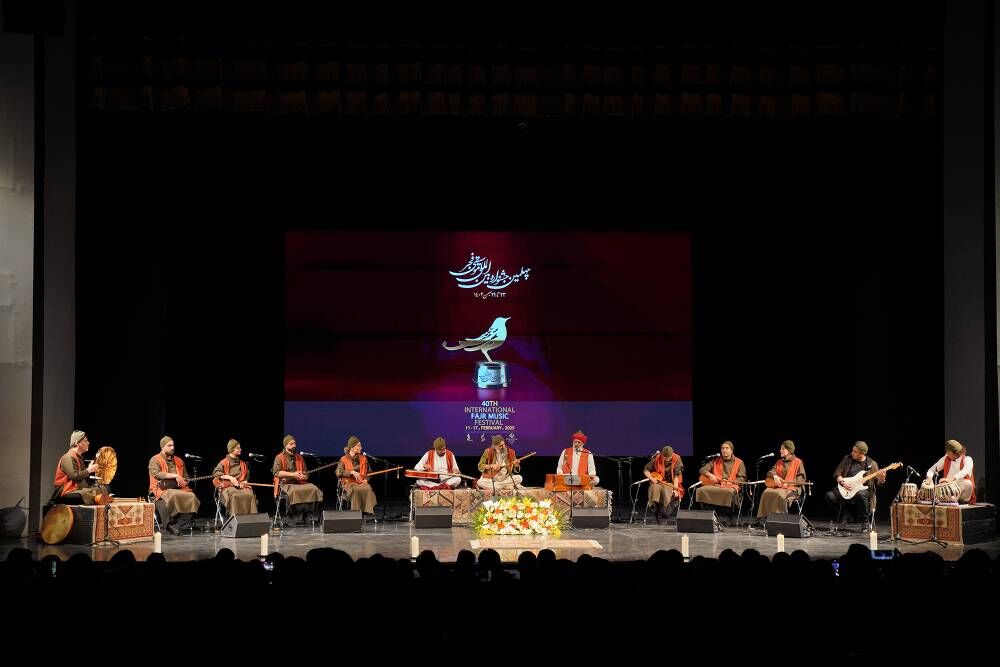
On the third night of the 40th Fajr International Music Festival, a joint concert between Iran and India titled “Molaghat” (“The Meeting”) infused Vahdat Hall with a mystical and passionate atmosphere. The performance brought together Iran’s “Hello Baba” ensemble, led by Vahid Ayranian, and India’s “Avaye Zamin” ensemble, showcasing a fusion of the two nations’ spiritual musical traditions. With diverse instrumentation, compositions themed around love and mysticism, and exhilarating solos, the concert created a trance-like and energetic experience for the audience.
The concert began with an introduction and recognition of the participating musicians. The lineup included seven Iranian performers playing tanbur, electric guitar, and daf, and three Indian musicians: Pavon Naik (harmonium), Godai Ramadai (tabla), and Amano Manish (slide guitar). Vahid Ayranian, positioned center stage, not only sang and played but also conducted the ensemble.
The stage design was executed with precision and care—lit candles at the front and flower arrangements at the center created a warm, intimate ambiance. The concert drew an enthusiastic turnout, and Vahdat Hall was filled to capacity.
The pieces performed evoked a deeply spiritual, Sufi-inspired mood, centered around themes of divine love and mysticism. Repetition—both lyrical and rhythmic—played a key role in crafting a meditative and whirling state, a hallmark of this musical style. This characteristic was clearly present in the performance, inviting the audience into a musical form of contemplation.
Beyond the auditory elements, the performance emphasized sensory and emotional engagement. Set design, lighting, and the musicians’ coordination all worked harmoniously to create an immersive and impactful atmosphere. The synchronized movements of the tanbur players, combined with their intricate interwoven rhythms, added a strong visual dimension that significantly enriched the overall concert experience.
Among the poetry featured was the famous verse “Hele man ashegh-e zatam, nazer-e hosn-e sefatam” by Dehlavi, performed in a spiritual and impassioned tone. Also included was the well-known piece “Mast Qalandar,” a tribute to Imam Ali (AS). This piece, central in the Sufi musical tradition, was delivered with powerful percussive rhythms and fervent repetitions, creating a communal sense of dhikr (remembrance) and mystical ecstasy among the audience.
These selections reflected a successful musical and cultural blend, intertwining the mystical elements of both Iranian and Indian traditions in a way that immersed the audience in deep reflection and joy.
A particularly intriguing aspect of the concert was the integration of electric guitar and harmonium, which added a fresh layer to the spiritual music. Their inclusion introduced harmonic and chordal elements rarely found in traditional Sufi music, enriching the overall sound texture.
The electric guitar, with its pad-like tones, contributed an ethereal, mysterious quality to the music that matched the overall spiritual ambiance. During more intense moments, the use of power chords injected an unexpected jolt of energy, blending tradition with modernity. This innovative mix offered the audience a unique and refreshing experience of spiritual music.
Other highlights included riveting solo performances by the Iranian daf and Indian tabla players. This segment, marked by vibrant and intricate rhythms, energized the concert and drew enthusiastic applause from the audience.
Overall, the concert lasted two hours, yet its dynamic and emotionally charged energy ensured that none of the attendees felt fatigued. The precise coordination among musicians, the diversity of the repertoire, and the passionate execution left a lasting impression, making for a memorable evening at Vahdat Hall.
Written By Farid Parish
